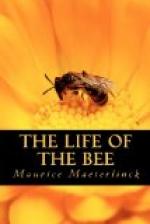We shall pass over many intermediary species, wherein we may see the gradual lengthening of the tongue, enabling more nectar to be extracted from the cups of corollas, and the dawning formation and subsequent development of the apparatus for collecting pollen,—hairs, tufts, brushes on the tibia, on the tarsus, and abdomen,—as also claws and mandibles becoming stronger, useful secretions being formed, and the genius that presides over the construction of dwellings seeking and finding extraordinary improvement in every direction. Such a study would need a whole volume. I will merely outline a chapter of it, less than a chapter, a page, which shall show how the hesitating endeavours of the will to live and be happier result in the birth, development, and affirmation of social intelligence.
We have seen the unfortunate Prosopis silently bearing her solitary little destiny in the midst of this vast universe charged with terrible forces. A certain number of her sisters, belonging to species already more skilful and better supplied with utensils, such as the well-clad Colletes, or the marvellous cutter of rose-leaves, the Megachile Centuncularis, live in an isolation no less profound; and if by chance some creature attach itself to them, and share their dwelling, it will either be an enemy, or, more often, a parasite.
For the world of bees is peopled with phantoms stranger than our own; and many a species will thus have a kind of mysterious and inactive double, exactly similar to the victim it has selected, save only that its immemorial idleness has caused it to lose one by one its implements of labour, and that it exists solely at the expense of the working type of its race.*
The humble-bees, for instance, have the Psithyri as parasites, while the Stelites live on the Anthidia. “As regards the frequent identity of the parasite with its victim,” M. J. Perez very justly remarks in his book “The Bees,” “one must necessarily admit that the two genera are only different forms of the same type, and are united to each other by the closest affinity. And to naturalists who believe in the theory of evolution this relationship is not purely ideal, but real. The parasitic genus must be regarded as merely a branch of the foraging genus, having lost its foraging organs because of its adaptation to parasitic life.”
Among the bees, however, which are somewhat too arbitrarily termed the “solitary Apidae,” the social instinct already is smouldering, like a flame crushed beneath the overwhelming weight of matter that stifles all primitive life. And here and there, in unexpected directions, as though reconnoitring, with timid and sometimes fantastic outbursts, it will succeed in piercing the mass that oppresses it, the pyre that some day shall feed its triumph.




